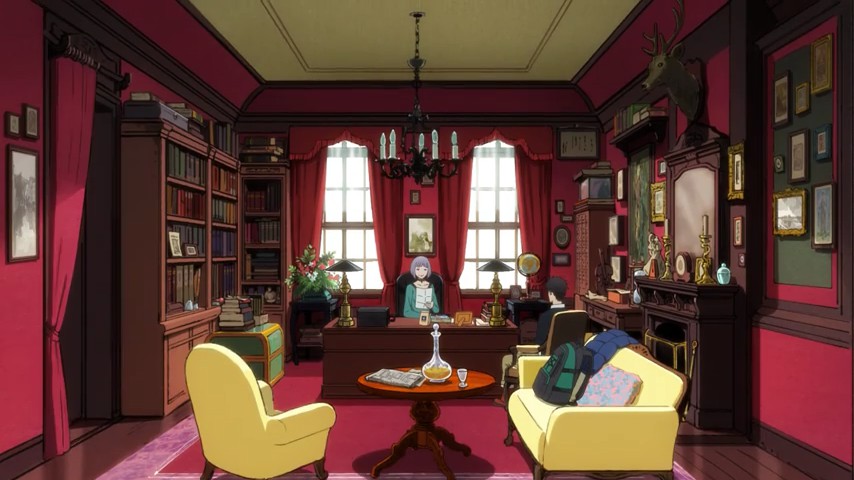 I’ve always felt that Tada-kun wa Koi wo Shinai was something of a litmus test for viewers, and I certainly don’t believe that to be any less true now. But my view on that has still evolved, in the sense that I no longer see this of it so much in terms of whether the viewer is a romantic. While this series certainly is a romance in the most literal (and literary) sense, to me the acid test for the viewer comes down to not being a romantic, but being a sentimentalist. Because for all its romantic tropes both Suginami and Hollywood, Tadakoi is a sentimental series pretty much top to bottom.
I’ve always felt that Tada-kun wa Koi wo Shinai was something of a litmus test for viewers, and I certainly don’t believe that to be any less true now. But my view on that has still evolved, in the sense that I no longer see this of it so much in terms of whether the viewer is a romantic. While this series certainly is a romance in the most literal (and literary) sense, to me the acid test for the viewer comes down to not being a romantic, but being a sentimentalist. Because for all its romantic tropes both Suginami and Hollywood, Tadakoi is a sentimental series pretty much top to bottom.
 That certainly doesn’t present a problem for me, as I’m unabashedly a fan of sentimental anime when they’re done well. Sentiment has been a casualty of the dictatorship of irony and snark in modern anime, so shows like this are increasingly rare – but I really think I’d like Tadakoi even if that weren’t the case. It has its flaws, but there’s something substantial at the core of it – a clear sense of what it wants to accomplish and of how to go about doing it.
That certainly doesn’t present a problem for me, as I’m unabashedly a fan of sentimental anime when they’re done well. Sentiment has been a casualty of the dictatorship of irony and snark in modern anime, so shows like this are increasingly rare – but I really think I’d like Tadakoi even if that weren’t the case. It has its flaws, but there’s something substantial at the core of it – a clear sense of what it wants to accomplish and of how to go about doing it.
 This episode really should be in Tadakoi’s wheelhouse, so if it wasn’t one of the standouts that would be a really bad sign. Happily it was – this was clearly comfortable ground, and I think Tada-kun wa Koi wo Shinai handled this part of the story as well as it could realistically have been handled. Tada-kun coming to Larsenburg has been an inevitable development since the series started, and it needed to be done right. This was going to be an emotional crescendo, especially for Tada himself (and he represents the ultimate stoic, so that’s a big deal). There was a risk of going overboard in the direction of sentiment, but I think that trap has been avoided.
This episode really should be in Tadakoi’s wheelhouse, so if it wasn’t one of the standouts that would be a really bad sign. Happily it was – this was clearly comfortable ground, and I think Tada-kun wa Koi wo Shinai handled this part of the story as well as it could realistically have been handled. Tada-kun coming to Larsenburg has been an inevitable development since the series started, and it needed to be done right. This was going to be an emotional crescendo, especially for Tada himself (and he represents the ultimate stoic, so that’s a big deal). There was a risk of going overboard in the direction of sentiment, but I think that trap has been avoided.
 Larsenburg itself is very nicely rendered here. If you’ve ever been to that part of Europe you know how beautiful it can be in a fairy tale sort of way (how fitting) especially in winter. I loved the scenes of Tada making his way to the palace via Baroque grand squares and Christmas markets (a staple a northern Europe). Meanwhile, Kaoru-kun has managed to lose Tada at the airport in pursuit of chocolate spoons, but finds the typical tourist traps – and at one of those, sees a photo which clues him in as to who Teresa really is. At the palace itself Tada runs into a brick wall in the form of the palace guards, who – as is their charter – do not even acknowledge his presence.
Larsenburg itself is very nicely rendered here. If you’ve ever been to that part of Europe you know how beautiful it can be in a fairy tale sort of way (how fitting) especially in winter. I loved the scenes of Tada making his way to the palace via Baroque grand squares and Christmas markets (a staple a northern Europe). Meanwhile, Kaoru-kun has managed to lose Tada at the airport in pursuit of chocolate spoons, but finds the typical tourist traps – and at one of those, sees a photo which clues him in as to who Teresa really is. At the palace itself Tada runs into a brick wall in the form of the palace guards, who – as is their charter – do not even acknowledge his presence.
 Grandpa Shouzo was a bit cheeky in just giving Tada the “address” without telling him what it was – I think the time for secrets about all this has probably passed. It’s very fortunate that Reiko emerges and happens to see the ghost of the young man she certainly was in love with (and with whom she may just have conceived and birthed Tada-kun’s parents, though that’s one of several unanswered questions for the finale). And when Charles spots him in her office, the die is cast – the fated reunion is only moments away.
Grandpa Shouzo was a bit cheeky in just giving Tada the “address” without telling him what it was – I think the time for secrets about all this has probably passed. It’s very fortunate that Reiko emerges and happens to see the ghost of the young man she certainly was in love with (and with whom she may just have conceived and birthed Tada-kun’s parents, though that’s one of several unanswered questions for the finale). And when Charles spots him in her office, the die is cast – the fated reunion is only moments away.
 To an extent, this was the easy part – in terms of plotting if not execution. Tada was always going to follow Teresa, they were always going to meet, and she was always going to tell him the truth (that she’s engaged to Charles, and destined to be the Queen of Larsenburg). This is where the rubber meets the road – where the sentiment meets the romance and Tadakoi has to make the hard decisions about what happens with the plot. And it has quite a lot of them to make, given how cattywompus the relationship chart for this story is.
To an extent, this was the easy part – in terms of plotting if not execution. Tada was always going to follow Teresa, they were always going to meet, and she was always going to tell him the truth (that she’s engaged to Charles, and destined to be the Queen of Larsenburg). This is where the rubber meets the road – where the sentiment meets the romance and Tadakoi has to make the hard decisions about what happens with the plot. And it has quite a lot of them to make, given how cattywompus the relationship chart for this story is.
 In a perfect world, Teresa would follow her heart and be with Tada, leaving Charles for Alec. In a Roman Holiday world. she’d resign herself to her duty and Tada would return to Japan nursing a broken heart. What sort of world is Tadakoi going to leave us with? The responsibilities of a crown princess – even of a tiny nation like Larsenburg – are no joke, but that Teresa and Tada-kun are in love is not in the remotest of doubt. Indeed, when Ijuin-kun finds him in tears, it’s one of the most powerful moments of the series – the colossus of resignedness has crumbled at last. But even if one views this story as a fairy tale more than a Roman Holiday homage, not all fairy tales end with “And they lived happily ever after”. And depending on how you interpret it, “Tada-kun wa Koi wo Shinai” could be viewed as rather an ominous title…
In a perfect world, Teresa would follow her heart and be with Tada, leaving Charles for Alec. In a Roman Holiday world. she’d resign herself to her duty and Tada would return to Japan nursing a broken heart. What sort of world is Tadakoi going to leave us with? The responsibilities of a crown princess – even of a tiny nation like Larsenburg – are no joke, but that Teresa and Tada-kun are in love is not in the remotest of doubt. Indeed, when Ijuin-kun finds him in tears, it’s one of the most powerful moments of the series – the colossus of resignedness has crumbled at last. But even if one views this story as a fairy tale more than a Roman Holiday homage, not all fairy tales end with “And they lived happily ever after”. And depending on how you interpret it, “Tada-kun wa Koi wo Shinai” could be viewed as rather an ominous title…












































Bel
June 23, 2018 at 6:35 amThis episode hits all the right notes for me. Seeing as how most of the characters in this series are in love with someone who’s in love with someone else, I assume whatever between Reiko-san and grandpa is probably unrequited as well. Anyway, the episode title for episode 13 sure sounds ominous…
Jennifer
June 23, 2018 at 8:44 pmIf I felt anything described this overall episode, it would be from Alec. “Even if I admit my feelings, would anything come of it?” Seeing both Tada and Teresa’s reactions of it hit all the right notes for me.
Erf
June 26, 2018 at 7:30 pmThis was pretty much a parallel to his grandpa. I guess they’ll always retain that love for each other in their hearts but there won’t be a way to bring that towards realization.
I haven’t been following your commentary since earlier but that comment over the show being a homage to Roman Holiday was quite eye-opening. Teresa’s wardrobe and the opening scene with the Vespa seem too obvious to miss the more I look at it. And of course, the sad awareness that this might end up the same way. . . dang.
Guardian Enzo
June 26, 2018 at 8:02 pmThanks for the comment! I can hardly claim monopoly on that Roman Holiday thing, as it’s all over the interwebs now (and the credit sequences make it hard to miss, now that one knows). But I will say, before I knew any of that, I was writing in my 1st Impressions post about how the show seemed to be very much in the tradition of 50’s and 60’s Hollywood romances.